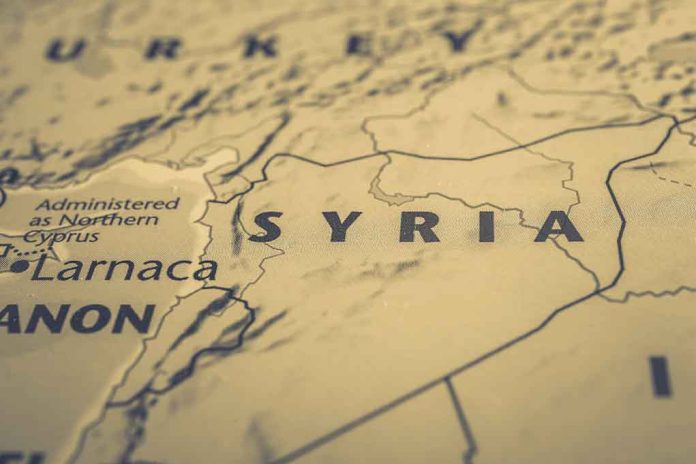
There’s no doubt about it – Iran is getting incredibly bold. In a move that’s really got the international community on the edge of it’s seat, an Iranian diplomat for the United Nations basically said that the US and Israel both need to pull all forces out of Syria. Tensions in Syria continue to rise, which has led many to believe the demand may signal their move towards escalating the war.
Iran’s Permanent Representative to the UN, Amiraeid Irani, voiced this plea during a recent Security Council meeting, citing humanitarian crises, foreign occupation, and terrorism as key issues plaguing the Syrian people. Irani didn’t mince words as he accused Western nations of prolonging the conflict through what he termed “unlawful occupation” and harsh sanctions that obstruct international aid for Syria’s reconstruction.
Iran demands US and Israel exit Syria as bigger war brews https://t.co/PzHCica3eB pic.twitter.com/AxwO4Uuys3
— Newsweek (@Newsweek) June 26, 2024
The Iranian diplomat’s statements reflect a growing boldness in Tehran’s foreign policy, particularly in its approach to regional conflicts. This assertiveness is likely emboldened by Iran’s expanding influence in Syria and its strengthened alliances with Russia and China. However, such provocative rhetoric only serves to further destabilize an already fragile situation.
Irani’s criticism was particularly pointed towards the United States, which he accused of supporting Kurdish-led militias in northeastern Syria. The presence of U.S. forces in Syria has long been a contentious issue, with critics arguing that it lacks a clear legal basis under international law. However, supporters of the U.S. presence contend that it serves as a crucial counterbalance to Iranian and Russian influence in the region.
🚨 In a statement at the UN Security Council, Iran's top diplomat, Amir Saeid Iravani, has called for the immediate withdrawal of U.S. and Israeli forces from Syria. This plea comes as conflicts intensify across the Middle East, raising fears of a broader regional war. The U.S.…
— AL Khammas (@ALkhammas2) June 26, 2024
Israel, too, found itself in Iran’s crosshairs. Irani condemned what he described as Israel’s “continuous aggression against Syria’s sovereignty” and its occupation of the Golan Heights. It’s worth noting that Israel has indeed been conducting airstrikes in Syria, targeting Iranian-linked positions and factions. However, these actions are often framed by Israeli officials as necessary defensive measures against Iranian entrenchment on its northern border.
The escalating tensions between Iran and Israel in Syria are part of a broader pattern of conflict that extends beyond Syrian borders. Recent clashes between U.S. forces and “Axis of Resistance” militias in Iraq underscore the regional nature of this confrontation. These Iran-backed militias have been increasingly active, posing a significant threat to U.S. interests and personnel in the region.
My latest: Iran demands US and Israel exit Syria as bigger war brews
Tehran issued a fresh appeal at the UNSC as conflict in Gaza, Lebanon and elsewhere in Middle East threatened to spark an even larger-scale regional confrontationhttps://t.co/PcPbpbgrdR
— 𝕋om 𝕆'ℂonnor (@ShaolinTom) June 26, 2024
During the UN Security Council meeting, accusations flew from all sides. Syrian Representative Qusay al-Dahhak echoed Iran’s sentiments, blaming the U.S. and its allies for destabilizing the region. In contrast, U.S. Ambassador Linda Thomas-Greenfield pointed the finger at Iran and Syria for aiding militias that threaten regional stability.
The situation in Syria remains precarious, with the UN deputy special envoy for Syria highlighting the ongoing tense and violent security situation. This instability not only affects Syrians but also has far-reaching implications for regional and global security.
Russia’s alignment with Iran in calling for the withdrawal of U.S. troops from Syria adds another layer of complexity to the situation. This united front between Moscow and Tehran presents a significant challenge to U.S. interests in the region and could potentially shift the balance of power in Syria.
The ongoing conflict in Syria has long been a proxy battleground for regional and global powers. As Eran Etzion, former head of policy planning at the Israeli Foreign Ministry, noted in a separate context, “It’s crucial to differentiate between the current level of hostility and the potential for a full-blown regional war. The stakes are vastly different.”
Indeed, the stakes in Syria are high, and the potential for escalation is real. Iran’s growing influence in the country, coupled with its support for various militant groups across the region, poses a significant threat to both U.S. and Israeli interests. The Israeli Defense Forces (IDF) have been clear about this threat, with IDF spokesperson Rear Admiral Daniel Hagari stating that “for years, and even more so during the war, Iran has been financing, directing, and arming its proxies—in Lebanon, Gaza, Syria, Iraq, and Yemen—to attack the State of Israel, and not only the State of Israel but other countries in the region and not only in the region.”
The Syrian government’s stance in this conflict is also noteworthy. As a close ally of Iran, Syria has welcomed Iranian military advisers and allowed the establishment of Iranian-linked military facilities on its soil. This cooperation has been crucial for Iran’s strategy of creating a “land bridge” from Tehran to the Mediterranean, a development that Israel views as an existential threat.
The Syrian Mission to the United Nations has been vocal in its criticism of Israel, labeling it as “the primary source of regional unrest” due to its actions in Gaza and abroad, including in Syria. The mission has also criticized the U.S. for its support of Israel, accusing Washington of actively participating in Israel’s war on Palestinians and justifying its alleged crimes.
As tensions continue to simmer, the international community watches with bated breath. The potential for a wider conflict looms large, with Iran’s call for U.S. and Israeli withdrawal from Syria serving as a stark reminder of the complex web of alliances and enmities that define the modern Middle East.
In conclusion, while Iran’s demand for U.S. and Israeli withdrawal from Syria may seem like diplomatic posturing, it underscores the volatile nature of the region’s geopolitics. The interplay of various state and non-state actors, each with their own agendas and alliances, creates a tinderbox situation where a single misstep could ignite a wider conflagration. As the U.S. and its allies navigate this complex landscape, they must remain vigilant and prepared for any eventuality while working towards a stable and secure Middle East.
So what do you think of the situation at large? Should the US and Israel leave the region? Can we afford to be move involved in another conflict? Feel free to email us and let us know your thoughts.
Quote of the Day:
“War does not determine who is right – only who is left.” ~Bertrand Russell
Joke of the Day:
Civil war jokes?
I General Lee don’t find them funny.





